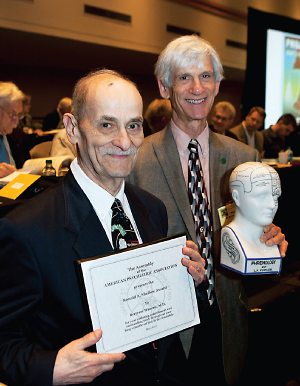MOC Among Top Issues Taken on by Assembly
Abstract
The Assembly, meeting last month in Philadelphia, continued to voice opposition to aspects of the maintenance of certification (MOC) process, particularly the requirement that physicians obtain written feedback from several patients over the course of each five-year period. This and other MOC requirements are mandated by the American Board of Medical Specialties, of which the American Board of Psychiatry and Neurology (ABPN) is a member and is thus obligated to follow the parent organization’s procedures. The ABPN does not require that psychiatrists submit the feedback surveys to it.

Bruce Hershfield, M.D., past speaker of the Assembly (right), presents the Ronald A. Shellow Award to Bertram Warren, M.D., at last month’s Assembly meeting. Warren was recognized for his “enduring commitment and outstanding work” throughout his long, valuable service in the Assembly.
The patient-feedback mandate is part of the Performance in Practice (PIP) requirement of MOC, but many psychiatrists have voiced strong opposition to it, insisting that it compromises the psychiatrist-patient relationship and may violate psychiatric ethics. (The APA Ethics Committee has stated that asking for such feedback does not violate ethical boundaries.) Opponents also maintain that there has been no field testing to find out whether surveying patients about their care has any impact on the quality of care.
Some speakers at the Assembly meeting indicated, however, that obtaining feedback from several patients was not a serious concern in their experience. Steve Koh, M.D., for example, pointed out that he and other residents routinely receive patient feedback as part of their training, and this process has been one of the most valuable tools in their education and improves rather than hinders patient care. Others pointed out that APA leaders have met with ABPN officials to discuss members’ opposition to some elements of MOC and have developed several tools to educate APA members about MOC requirements.
But the majority of Assembly delegates agreed with opponents, voting to urge the Board of Trustees “to take a formal position opposing implementation of the ABPN’s PIP requirements for maintenance of certification until scientific evidence has shown that those requirements improve quality of care.”
The Assembly also heard the first report from its Maintenance of Certification Committee, in which James Batterson, M.D., the committee’s chair, described its charge and goals. He noted that the committee will study both MOC and maintenance of licensure systems and “evaluate their appropriateness and effectiveness in maintaining competence for psychiatric physicians.” Committee members have been assigned to collect MOC-related information from ABPN and the American Board of Medical Specialties to get a better sense of what their systems entail, he said.
The Assembly also addressed another topic high on the agenda of many psychiatrists, namely, the adoption of electronic medical records and related confidentiality concerns. Representatives voted to urge APA to “strengthen educational materials for use by both the public and clinicians that address advantages and disadvantages of electronic medical/psychiatric records so that they can be well informed about the degree of safety and the maintenance of proper standards of privacy and confidentiality for networked electronic records.”
Access-to-Care Issues Addressed
Assembly members also endorsed proposals affecting access to mental health services, including one encouraging the Department of Veterans Affairs (VA) to access the states’ prescription monitoring programs. Supporters of the proposal said that physicians writing prescriptions in the VA system do not have access to state prescriptionmonitoring programs. This makes it easier for veterans and active military trying to obtain controlled substances such as opiates and benzodiazepines to obtain multiple prescriptions by “doctor shopping,” contributing to the country’s epidemic of prescription-drug abuse.
The proposal calls on APA to have the Department of Government Relations lobby the VA to change its policy so that “health care providers [are] permitted to utilize [state] prescription monitoring program sites … for more effective monitoring of controlled medications that include narcotics and benzodiazepines,” noting that the ability to have such access is critical for psychiatrists and other physicians to provide effective medical management.
The Assembly also endorsed a proposal calling on APA to advocate for legislation or regulatory action for the “continued availability of medication that in the opinion of the currently treating physician has been effective throughout the course of a patient’s treatment episode” regardless of changes in the patient’s health plan or drug formulary coverage.
Votes Taken on Other Issues
Among the Assembly’s other actions were votes to
have APA develop a position statement disapproving the use of marijuana as a treatment for posttraumatic stress disorder, in light of its abuse potential and lack of evidence for its efficacy for that disorder. | |||||
consider implementation of a plan in which APA would share revenue with district branches and state associations. | |||||
establish an annual award for the district branch with the largest numerical increase in members and another award for the district branch with the largest percentage membership increase. | |||||
have the Membership and Budget committees explore the cost of providing free copies ofDSM-5to all APA members. | |||||
urge the Board to appoint a task force to develop a long-term strategy for “sustainable funding” of programs and fellowships for members-in-training. | |||||
reject a proposal to have APA reverse its policy of “not allowing the pharmaceutical industry to provide support for continuing education at APA meetings” and “invite submissions of industry-supported symposia” starting with the 2013 annual meeting. | |||||
In addition, Area 2 presented its 2012 Warren Williams Speaker’s Award to Laura Fochtmann, M.D., during this meeting, recognizing her extensive contributions to the study of ECT and her critical assistance to the New York State Psychiatric Association in advocating with state officials for access to this form of treatment. Fochtmann is also medical editor of the APA Practice Guidelines project and recently completed a three-year term as chair of the APA Committee on Electronic Health Records. 
Assembly meeting archives can be accessed at www.psychiatry.org/network/board-of-trustees/governance-meeting-archives?CookieExpires=5/30/2012%209:40:39%20AM.



